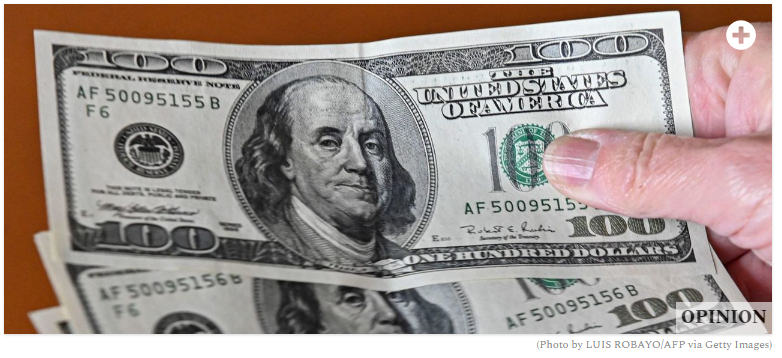|
Inflation might be cooling some, but recent reports suggest many Americans aren’t economically optimistic. Despite President Biden continuing to celebrate the success of his “Bidenomics” approach, the reality is that purchasing power is still down, and job market weaknesses remain. So, why is the current administration so proud? It seems deficit spending is the reason.
A poll from Monmouth University found that only one in four Americans believe the country is headed in the right direction, and a significant 62% disapprove of how Biden is handling inflation. And it’s no wonder, considering that real wages have failed to keep up with inflation for a staggering 26 consecutive months. Understandably, people are becoming weary. The latest CPI report shows a moderate decline in headline inflation to 3% in June 2023 from the previous month’s 4%. However, core inflation, which excludes food and energy prices, remains stubbornly high at 4.8% year over year. This improvement shows some relief, but to get the economy back on track, we must address the underlying inflationary pressures caused by deficit-spending of more than $6 trillion funded by a bloated Federal Reserve balance sheet, which is declining too slowly. Turning to the latest jobs report for June, the figures are disappointing, falling well below expectations. Only 99,000 net jobs were added after accounting for downward revisions in the two prior months. Moreover, many of these jobs were government jobs, straining the productive private sector that pays for those jobs. According to the household survey, employment has remained nearly stagnant since March, indicating a lack of substantial job creation. To make matters worse, the labor force participation rate has yet to return to its pre-pandemic rate, indicating millions of Americans are uncertain about their job prospects. Even for employed people, their purchasing power is down, and renters and individuals from low socio-economic backgrounds are struggling. If this is the outcome of “Bidenomics,” it’s clear that a different approach is necessary to restore the American economy. The government must rein in spending, and the Federal Reserve should be more aggressive in cutting its balance sheet. Despite the lackluster evidence that his initiatives are helping, President Biden continues to approve increased deficit spending through initiatives like the Inflation Reduction Act, which is estimated to cost over $1 trillion. The national debt has surpassed $32 trillion, translating to roughly $95,000 owed per American or almost $250,000 per taxpayer, far exceeding the country’s economic output. This continuous increase in spending, coupled with kicking the problem down the road for future generations to tackle, as seen in the latest debt ceiling deal, won’t effectively lower inflation or provide the economic relief Americans desperately need. A different direction is essential, involving responsible budgeting to curb excessive spending and align expenditures with means. Congress should consider passing a strict spending limit with a growth rate that better matches the average taxpayer’s ability to fund government spending, calculated based on the maximum rate of population growth plus inflation. If Congress had adhered to this maximum spending growth rate from 2003 to 2022, there could have been a cumulative $500 billion debt increase instead of the actual $19 trillion increase, resulting in $18 trillion in static savings for taxpayers. In essence, restraining spending now is pro-growth and will foster greater economic prosperity. The latest inflation and jobs reports suggest that the touted “Bidenomics” approach leaves much to be desired. To secure a brighter economic future, current economic strategies need serious reevaluation that focus on fiscal responsibility and sustainable growth. Originally published at The Daily Caller.
0 Comments
Leave a Reply. |
Vance Ginn, Ph.D.
|


 RSS Feed
RSS Feed